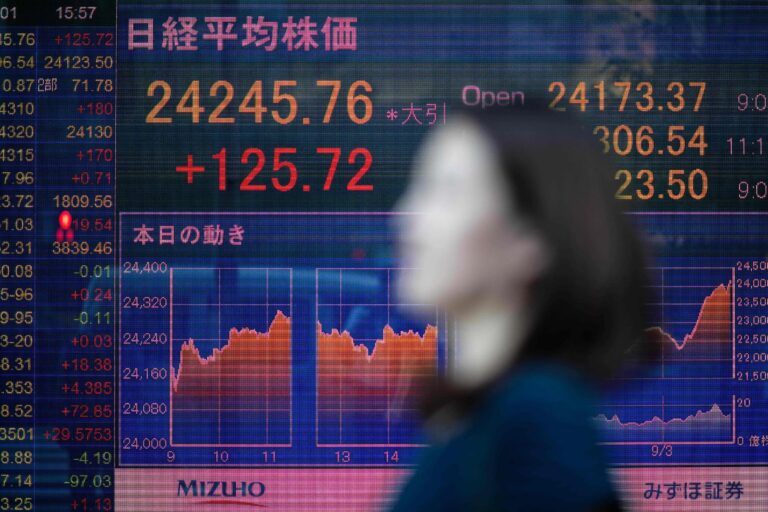Japan’s stock markets are poised for a decline following the release of recent US economic data that has heightened concerns about global growth prospects. According to Bloomberg, indicators from the United States have unsettled investors, triggering fears of a potential slowdown that could ripple through international markets. This development comes amid ongoing uncertainty in the global economy, prompting traders to reassess risk and adjust their positions accordingly.
Japan’s Stock Market Faces Pressure Following Weak US Economic Indicators
Investors in Tokyo reacted swiftly as recent US economic reports painted a bleaker outlook for growth, sending ripples through Asian markets. The Nikkei 225 faced notable declines amid concerns over waning demand and potential tightening of monetary policies overseas. Analysts highlight that the sluggish US indicators have amplified fears of a global economic slowdown, forcing traders to reassess risk exposure and recalibrate portfolios with an eye on stability.
Key factors influencing the downturn include:
- Slowing US manufacturing data signaling reduced industrial output
- Lower consumer confidence raising doubts about future spending
- Speculations on Federal Reserve policy adjustments impacting liquidity sentiment
The below table summarizes recent market reactions compared to previous periods:
| Index | Change (%) Today | Change (%) One Week |
|---|---|---|
| Nikkei 225 | -1.3% | -2.7% |
| Topix | -0.9% | -1.8% |
| US S&P 500 | -1.5% | -2.3% |
Analysis of Key Sectors Most Vulnerable to Global Growth Concerns
Several industries in Japan are facing heightened pressure as global economic growth concerns ripple through markets following disappointing US data. The export-driven manufacturing sector stands particularly vulnerable due to its heavy reliance on robust demand from overseas partners, especially the US and China. Semiconductor and automotive manufacturers, both pillars of Japan’s industrial output, are already signaling slower order books and inventory adjustments, reflecting broader uncertainty. Additionally, the capital goods segment is bracing for reduced corporate spending globally, a trend that threatens to stall production upgrades and large-scale investments.
- Technology components: Impacted by supply chain disruptions and faltering global tech demand.
- Automotive exports: Weakening overseas sales amid softer consumer sentiment.
- Industrial machinery: Delays in new projects due to cautious business outlooks.
| Sector | Growth Impact | Key Risk Factors | |||||||||||||||
|---|---|---|---|---|---|---|---|---|---|---|---|---|---|---|---|---|---|
| Manufacturing | High | Demand contraction, supply chain issues | |||||||||||||||
| Automotive | Moderate to High | Export market slowdown, input cost volatility | |||||||||||||||
| Capital Goods | Medium | Investment pullback, The provided content discusses challenges facing several Japanese industries due to global economic concerns, especially after weak US data. Here’s a summary and key points:
OverviewJapan’s export-reliant industrial sectors are feeling pressure amid a slowing global economy, with downstream effects particularly visible in manufacturing, automotive, and capital goods. These sectors depend heavily on demand from major overseas markets like the US and China. Key Industry Challenges
Specific Areas Impacted
Summary Table| Sector | Growth Impact | Key Risk Factors | If you need a more detailed analysis, forecast, or recommendations based on this data, please let me know! Strategic Investment Moves Investors Should Consider Amid Rising Market UncertaintyIn the face of increasing volatility triggered by shaky US economic data, investors are urged to recalibrate their portfolios with a focus on resilience and diversification. The anticipated slump in Japanese equities underscores the necessity of hedging against sector-specific downturns. Experts advise considering assets with historically low correlation to equity markets, such as government bonds, gold, and select alternative investments, to cushion potential shocks. Additionally, staying alert to shifts in monetary policy and inflation indicators can help investors time their moves more effectively. Strategic options include:
In ConclusionAs investors digest the latest economic data out of the United States, concerns over slower growth have cast a shadow on Japan’s equity markets. The anticipated decline in Japanese stocks underscores the interconnected nature of global markets and highlights the sensitivity of regional equities to shifts in US economic indicators. Market participants will be closely watching upcoming data releases and central bank signals to gauge the trajectory of both the US and Japanese economies in the near term. |




